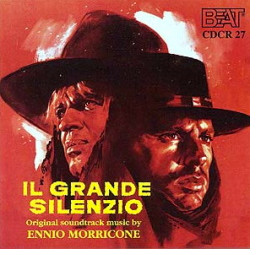主页--->m-comment-000--->mb-comment-006-65
|
电脑版 |
|||||||||||||||||||||||||||||||||||||||||||||||||||||
布罗克斯顿评说莫里康内 MB-006-65 |
||||||||||||||||||||||||||||||||||||||||||||||||||||||
FA6812 Il grande silenzio
/ The Great Silence / 雪海深仇 / 伟大的寂静 |
||||||||||||||||||||||||||||||||||||||||||||||||||||||
作者 乔纳森·布罗克斯顿 (Jonathan Broxton) |
||||||||||||||||||||||||||||||||||||||||||||||||||||||
ENNIO MORRICONE 评论,第6部分 006-65 |
||||||||||||||||||||||||||||||||||||||||||||||||||||||
 |
||||||||||||||||||||||||||||||||||||||||||||||||||||||
IL GRANDE SILENZIO [THE GREAT SILENCE] (1968年) Il Grande Silenzio 是一部广受好评的意大利面条西部片,由伟大的塞尔吉奥·科尔布奇执导。这部电影以 1890 年代犹他州一个白雪皑皑的小镇上为背景,由法国演员让·路易斯·特林蒂尼昂 (Jean Louis Trintignant) 饰演一位名叫沉默的枪手,他在小时候目睹父母被土匪谋杀后,致力于保护弱者和受压迫者; 他在袭击中幸存下来,因这次经历而变得哑巴,因此他的名字。多年后,当雇用杀害他家人的土匪的腐败官员波利卡特(路易吉·皮斯蒂利饰)雇用了一位名叫洛科(克劳斯·金斯基饰)的新的、更恶毒的赏金猎人杀死犹他州的市民时,沉默有机会为他的过去报仇,作为非法土地所有权阴谋的一部分。这是一个复杂的故事,充满了政治色彩,科尔布奇说这是对切·格瓦拉(Che Guevara)和马尔科姆·X(Malcolm X)最近死亡的故意评论。 莫里康内为这部电影配乐是他在西部片中最传统的作品之一,更像是一部相当直接的黑暗剧,没有所有古怪的想法和另类的乐器。也许这部电影被雪覆盖的地点与此有关; 乐谱的大部分内容都弥漫着冰冷的荒凉,既反映了沉默的孤独,也反映了他对复仇的渴望。 主旋律,如开场提示“Il Grande Silenzio (Restless)”所呈现的,其实相当可爱,带有田园的音调和轻快的旋律,由弦乐、吉他和几乎难以察觉的指钹发出的声音,就像滴落的冰柱一样。在乐曲的后半部分出现的人声,增添了一层温暖和人性,这在后来可爱的“Viaggio”中得到了概括。然而,所有这些温暖后来在“E l'Amore Verra”、“Voci Nel Deserto”和忧郁的“Gli Assassini e la Madre”等线索中被剥离了,它们以一种苦涩的感觉呈现了主题,与电影凄凉、寒冷的背景相匹配。在第二个提示中,凄美的声乐版本的主题尤其令人印象深刻。 动作音乐以“Passaggi Nel Tempo”、“Barbara e Tagliente”等为线索,大胆而尖锐,使用另类的节奏理念、不寻常的嚎叫声、颤音的小号和尖锐、刺耳的木管乐器来增加紧张感,营造出悬念和迫在眉睫的危险感。这里也有主旋律的元素,确保沉默的存在被标记出来。 还有一个爱情主题,它首先出现在提示“Invito all'Amore(沉默的爱)”中。然而,这不是你典型的浪漫爱情; 莫里康内对《寂静》的爱情主题以小提琴独奏为基础,伴有紧张的钢琴织体,具有一种苦涩、萦绕的品质,仿佛承认寂静的毁容意味着他永远不会真正完全了解这种情感。它在最后的“L'Ultimo Gesto”中的表演以一系列音效开始——敲击的钢琴、刺耳的弦乐、潺潺的打击乐——并逐渐增加强度,然后在 3 分 20 秒左右出现令人震惊的变化,以歌剧、悲剧的音符结束乐谱。 与所有莫里康内的乐谱一样,多年来,《Il Grande Silenzio》在欧洲和亚洲的各种LP和CD上以许多不同的唱片公司发行了无数次。我最喜欢的版本是意大利唱片公司 Beat Records 于 1995 年发行的版本,其中包含 1969 年电影 Un Bellissimo Novembre 中的一些配乐曲目。 曲目列表: 1. Il Grande Silenzio (Restless) (2:28), 2.Passaggi nel tempo (2:25), 3.E l'Amore Verra (2:00), 4.Barbara e Tagliente (2:02), 5.Prima Che Volino I Corvi (2:31), 6.不动 (3:28), 7.维亚乔 (1:53), 8.Voci nel Deserto (2:40), 9.Gli Assassini e la Madre (3:20), 10.Invito all'Amore (无声的爱) (4:00), 11.Nel Vecchio 沙龙 (1:12), 12.L'Ultimo Gesto (4:25), 13.Dopo il Martirio (01:41).打破记录 CDCR-27,34 分 38 秒。 |
||||||||||||||||||||||||||||||||||||||||||||||||||||||
2020.9.19 |
||||||||||||||||||||||||||||||||||||||||||||||||||||||
|
| ||||||||||||||||||||||||||||||||||||||||||||||||||||||
以下是原文
| ||||||||||||||||||||||||||||||||||||||||||||||||||||||
ENNIO MORRICONE REVIEWS, Part 6-65 |
||||||||||||||||||||||||||||||||||||||||||||||||||||||
IL GRANDE SILENZIO [THE GREAT SILENCE] (1968) Il Grande Silenzio is a critically acclaimed Spaghetti western directed by the great Sergio Corbucci. The film is set in a snow-bound Utah town in the 1890s and stars French actor Jean Louis Trintignant as a gunslinger named Silence, who has dedicated himself to protecting the weak and downtrodden after witnessing his parents being murdered by bandits as a child; he survived the attack, was rendered mute by the experience, hence his name. Silence gets the opportunity to avenge his past many years later when Pollicut (Luigi Pistilli), the corrupt official who hired the bandits that killed his family, hires a new and even more vicious bounty hunter named Loco (Klaus Kinski) to kill the Utah townspeople as part of an illegal land ownership plot. It’s a complicated story, filled with political undertones, which Corbucci said were intentional commentaries on the then-recent deaths of Che Guevara and Malcolm X. Morricone’s score for the film is one of his most conventional efforts in the western genre, playing more like a fairly straightforward dark drama without all the quirky ideas and offbeat instrumentation. Perhaps the film’s snowbound location had something to do with it; there is a vein of icy desolation running through much of the score, reflecting both Silence’s isolation and his desire for revenge. The main theme, as presented in the opening cue “Il Grande Silenzio (Restless)” is actually quite lovely, with a pastoral tone and a lilting melody carried by strings, guitars, and almost imperceptible finger-cymbals like sound like dripping icicles. The vocals that come in during the second half of the piece, adding a layer of warmth and humanity, which is recapitulated later in the lovely “Viaggio”. However, all this warmth this is stripped away later in cues like “E l’Amore Verra,” “Voci Nel Deserto,” and the melancholy “Gli Assassini e la Madre,” which present the theme with a sense of bitterness that matches the film’s bleak, wintry setting. The poignant vocal version of theme in the second of those cues is especially impressive. The action music in cues like “Passaggi Nel Tempo,” “Barbara e Tagliente,” and is bold and spiky, using offbeat rhythmic ideas, unusual howling vocals, trilling trumpets, and shrill, stabbing woodwinds to raise the tension and create a sense of suspense and imminent danger. There are elements of the main theme in here too, ensuring that Silence’s presence is marked. There is a love theme too, which first appears in the cue “Invito all’Amore (Silent Love)”. This isn’t your typical romantic love, however; Morricone’s love theme for Silence is anchored by a solo violin accompanied by nervous piano textures, and has a bitter, haunted quality, as if acknowledging that Silence’s disfigurement means he will never truly know that emotion fully. Its performance in the conclusive “L’Ultimo Gesto” begins with a series of sound effects – tapped pianos, shrill strings, gurgling percussion – and gradually increases in intensity before emerging into a shattering variation at around the 3:20 mark that ends the score on an operatic, tragic note. As is the case with all Morricone scores, Il Grande Silenzio has been released numerous times over the years, on various LPs and CDs across Europe and Asia on numerous different labels. My favored version is the one released by Italian label Beat Records in 1995, which comes with a few bonus tracks of score from the 1969 film Un Bellissimo Novembre. Track Listing: 1. Il Grande Silenzio (Restless) (2:28), 2. Passaggi Nel Tempo (2:25), 3. E l’Amore Verra (2:00), 4. Barbara e Tagliente (2:02), 5. Prima Che Volino I Corvi (2:31), 6. Immobile (3:28), 7. Viaggio (1:53), 8. Voci Nel Deserto (2:40), 9. Gli Assassini e la Madre (3:20), 10. Invito all’Amore (Silent Love) (4:00), 11. Nel Vecchio Saloon (1:12), 12. L’Ultimo Gesto (4:25), 13. Dopo Il Martirio (01:41). Beat Records CDCR-27, 34 minutes 38 seconds. |
||||||||||||||||||||||||||||||||||||||||||||||||||||||
Sep 19, 2020 |
||||||||||||||||||||||||||||||||||||||||||||||||||||||
本站电影欣赏 |
||||||||||||||||||||||||||||||||||||||||||||||||||||||
在线音乐试听 |
||||||||||||||||||||||||||||||||||||||||||||||||||||||
|
||||||||||||||||||||||||||||||||||||||||||||||||||||||
 |
||||||||||||||||||||||||||||||||||||||||||||||||||||||
Jon 是一位电影音乐评论家和记者,自 1997 年以来一直担任全球最受欢迎的英语电影音乐网站之一 Movie Music UK 的编辑和首席评论员,并且是国际电影音乐评论家协会 (IFMCA) 的主席。在过去的 20多 年中,Jon 撰写了 3,000 多篇评论和文章,并进行了多次作曲家采访。在杂志刊物方面,乔恩曾为《电影配乐月刊》、《原声带杂志》和《电影音乐》等出版物撰写评论和文章,并为普罗米修斯唱片公司的两张经典 Basil Poledouris 配乐专辑《Amanda》和《Flyers / Fire on the Mountain》撰写了衬垫注释。他还为汤姆·胡佛 (Tom Hoover) 于 2011 年出版的《Soundtrack Nation: Interviews with Today's Top Professionals in Film, Videogame, and Television Scorering》一书撰写了一章。在1990年代后期,乔恩是伦敦皇家爱乐乐团的电影音乐顾问,并与他们合作拍摄了约翰·德布尼(John Debney)的音乐电影《相对价值》(Relative Values)和奥利弗·海斯(Oliver Heise)的音乐《佛陀的指环》(The Ring of the Buddha),以及与兰迪·纽曼(Randy Newman)合作的一系列音乐会。2012年,乔恩在波兰克拉科夫举行的第五届年度电影音乐节上担任“电影节学院”主席。他是作曲家和作词家协会的成员,该协会是作曲家、作词家和词曲作者从事电影、电视和多媒体工作的首要非营利组织。 |
||||||||||||||||||||||||||||||||||||||||||||||||||||||
2023.12.1 |
||||||||||||||||||||||||||||||||||||||||||||||||||||||
2023 手机版 |
||||||||||||||||||||||||||||||||||||||||||||||||||||||
|
||||||||||||||||||||||||||||||||||||||||||||||||||||||













